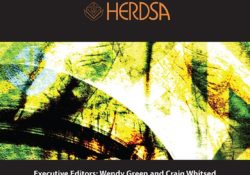tandfonline.com har udgivet en rapport under søgningen „Teacher Education Mathematics‟: ABSTRACT ABSTRACT The integration of ethics in engineering education has largely been focused at the curriculum design level. The authors posit that this integration be done at the accreditation level and investigate how ethics may be more extensively incorporated in the documentation of a particular engineering accreditation body’s qualification standards. The paper proceeds, by means of a narrative review, to justify an expanded conception of the teaching of ethics within engineering education. It builds a synthesis of contrasting conceptual approaches to the teaching of ethics within engineering and proposes a conceptual framework to guide both regulators and educators to identify and engage with different elements of the ethics across the curriculum within an engineering programme. The South African case study… Continue Reading →
Like this:
Like Loading...
tandfonline.com har udgivet en rapport under søgningen „Teacher Education Mathematics‟: ABSTRACT ABSTRACT The higher education market has prompted universities to justify their value and worth, especially to students. In Australia, New Zealand and the UK, it is increasingly common for universities to advertise their vision to prospective students, through Graduate Attributes, and showcase the sets of skills and competencies their graduates would develop throughout a degree. Whilst there are extensive studies in Australasia, research in the UK context is limited. This paper presents what we believe is the first national mapping of graduate attributes proposed by UK universities. Our analysis suggests four discourses that characterise the overarching qualities that UK students can expect to embody by graduation: self-awareness & lifelong learning, employability & professional development, global citizenship & engagement and… Continue Reading →
Like this:
Like Loading...
tandfonline.com har udgivet en rapport under søgningen „Teacher Education Mathematics‟: ABSTRACT ABSTRACT This article presents the development, validation and deployment of a scale with which higher education students self-assess their perceived employability. Underpinned by social cognitive career theory and Yorke and Knight’s (2007) USEM model for students’ attainment of employability, a perceived employability questionnaire was developed and piloted with 1849 university students. The final questionnaire was administered with students from over 15 Australian universities, resulting in a sample of 10,193 students. The scale was validated using exploratory and confirmatory factor analyses, resulting in a 14-factor employability measure that met the acceptable validity thresholds. The multi-factor perceived employability scale validates the USEM model and has implications for theory and practice. Link til kilde
Like this:
Like Loading...

